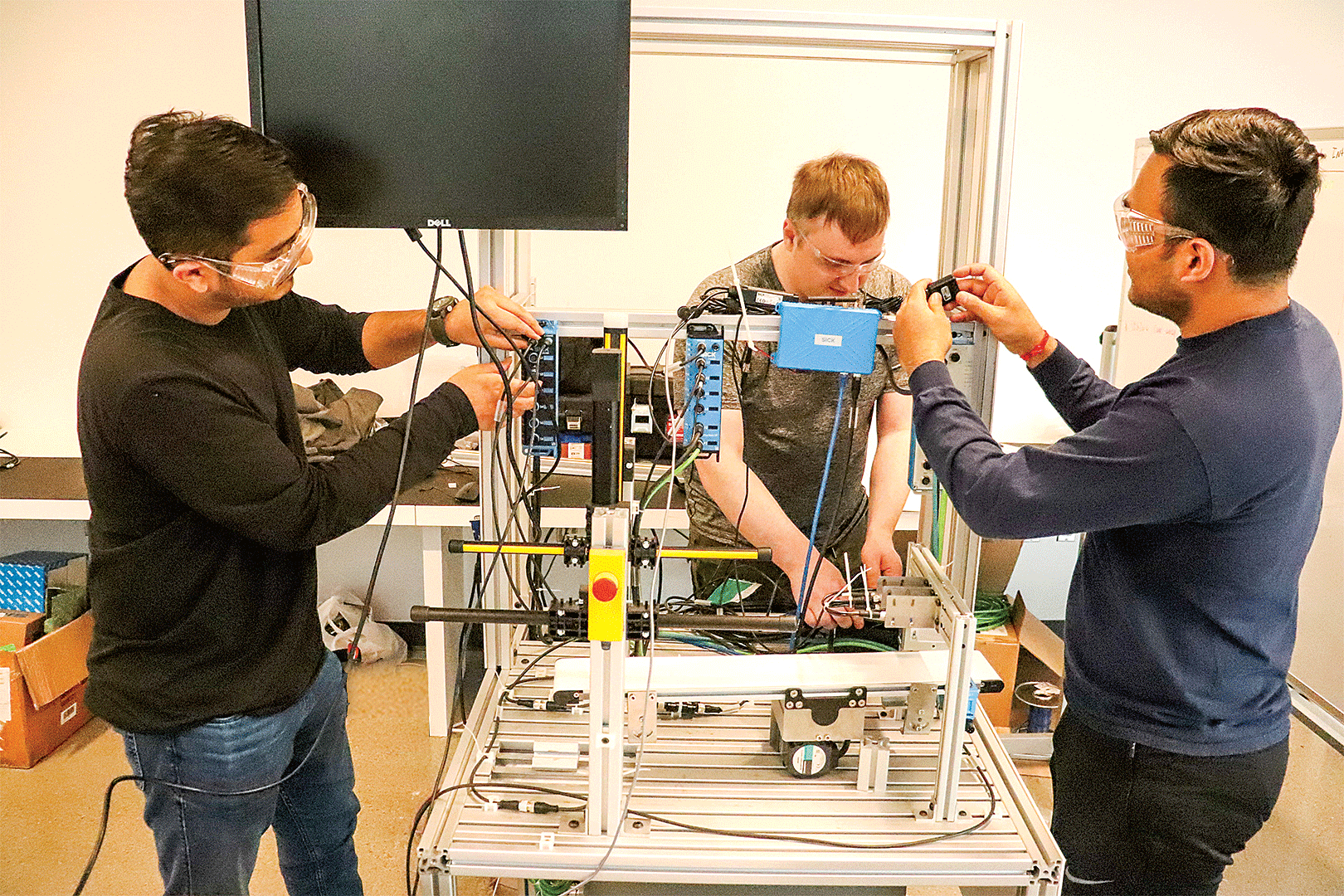
Training the next generation of automation technology experts
July 11, 2023
By Neal Mohammed

Canada’s manufacturing industry is experiencing a skills shortage, and the demand for automation technology experts is growing rapidly as our world increasingly relies on these industries. Humber College’s approach to preparing students for the field includes a focus on hands-on work, extensive research opportunities and a culture of innovation to train the next generation of automation technology experts.
Located on the College’s North Campus, the Barrett Centre for Technology Innovation (Barrett CTI) is a 93,000-square-foot facility designed to be a powerhouse of technological innovation which leverages Humber’s expertise in advanced manufacturing, digital transformation, automation and robotics, systems integration, as well as augmented and virtual realities.
The Barrett CTI is a hub for students to work alongside industry partners and members of the Advanced Manufacturing Skills Consortium: Cisco Canada, DMG MORI Canada, Festo Didactic, Trimech Solutions (formerly known as Javelin Technologies), KUKA Canada, Magna International, Rockwell Automation, SEW-EURODRIVE and SICK Canada. These partners have provided support on equipment, technical expertise, professional development opportunities and scholarships, and some have even built modern labs inside the Barrett CTI. Experiential learning opportunities are essential to developing the practical skills needed to work with automation technologies. Industry trends are fast-paced, and emerging technologies are changing the way we work. By getting ahead of the curve, students with hands-on training are better equipped to meet the demands of industry when they enter the workforce.
At Humber, students work alongside industry experts and faculty to come up with innovative ideas and create solutions in a risk-free environment. This allows students to embrace innovation, think outside the box and explore new possibilities. These industry-focused spaces provide a platform for collaboration and innovation that can drive progress in various fields, benefiting not only students but industry as well. Humber provides companies with spaces to do applied research, access to advanced equipment and technologies, and a team of faculty and students to build proof of concepts.
To innovate, you can’t be afraid to challenge the status quo. Students view things through a different lens. Their exuberance and courage to take risks make them a perfect fit to work and create unique ideas that, in turn, help industry partners.
Training at the Barrett CTI prepares individuals in advanced manufacturing, robotics applications, automation, systems integrations and digital transformation. Students work on industry projects in Industry 4.0, IoT, machine learning, condition monitoring, data analytics, mobile technology, visualization and blockchain cybersecurity.
The successful completion of recent industrial capstone projects is evidence of the fruitful collaboration between the Barrett CTI and its industry partners. Students and faculty of the Electromechanical Engineering program collaborated on several advanced manufacturing stations with SICK Canada and KUKA Robotics, including robot guidance applications. Using varying types of vision and sensor technologies, as well as equipment employing machine learning, AI, auto ID and industry 4.0 functionalities, students and staff were able to leverage the expertise of industry partners and develop their skills in systems integration technologies from various manufacturers.
“There really is no experience quite like working on your first-ever industrial project. Working with SICK Sensor Intelligence in creating the machine vision and auto ID demo cell was a fantastic opportunity,” said Hassan Ismail, a student in the Electromechanical Engineering program. “I was able to learn so much within the eight months of this project that I probably wouldn’t have been able to learn within the first few years of my career.”
Barrett CTI benefits can be seen beyond post-secondary students and industry partners. The Centre offers programming for K-12 students to visit the labs, learn about the latest technologies and connect with industry professionals.
Humber also collaborates with industry partners to offer practical and concise micro-credentials that enable professionals to expand their skills and knowledge in specific fields. The college hosts workshops and professional development activities that are led by industry experts. A recent example is a workshop on 3D scanning technology, which showcased how it can improve product design and stability with millimetre-level accuracy. The Barrett CTI also serves as a venue for hosting technology events that bring companies from around the world together to present their latest technologies and share best practices.
A recent $30 million donation from the Barrett Family Foundation will enable Humber to continue to advance and support industry-driven skills designed to enhance employability through workforce training, upskilling, and reskilling that will lead to a pipeline of diverse industry professionals.
Advertisement
- Top 10 Under 40 2023: Meet Alessia Alfieri, Project manager, Ethos Automation
- Canada welcomed over 32,000 tech workers in the past 12 months, report finds